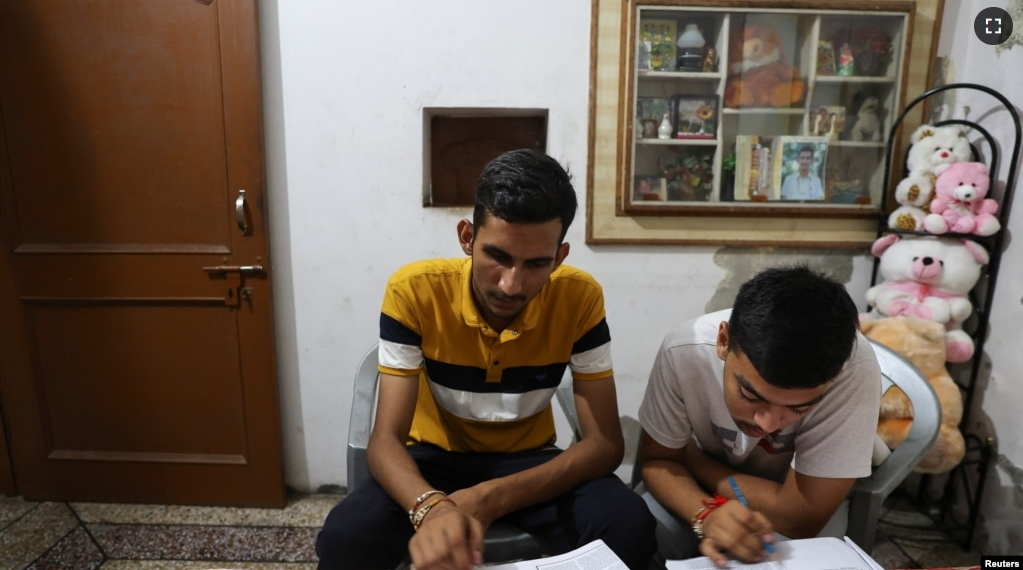Indian students have been coming to universities in the United States, Britain, Canada and Australia for many years.
But now that much of the nation is facing economic problems, students from lower-income, rural families are coming. They are gathering as much money as possible and asking universities for admission.
Sachin is a 19-year-old student who only uses one name. He spoke with the Reuters news agency about his future.
“My dream is to settle abroad as I see no future in India,” he said.
Sachin’s father withdrew all his money from the bank and also got a loan so his son could get a student visa to attend college in Canada. The money, over $25,000, went to an agency called Western Overseas that helps students learn English and get permission to study abroad.
Sachin plans to go to Canada for a two-year study program in business. He hopes that once he is there, the business degree will help him get a job and a work visa.
He said Canada has fewer restrictions on students staying to work after finishing a school program compared to the U.S. and Britain.
Sachin thinks the financial risk is worth it. He has two friends in Canada who are working while going to school. They earn about $900 each month from part-time work.
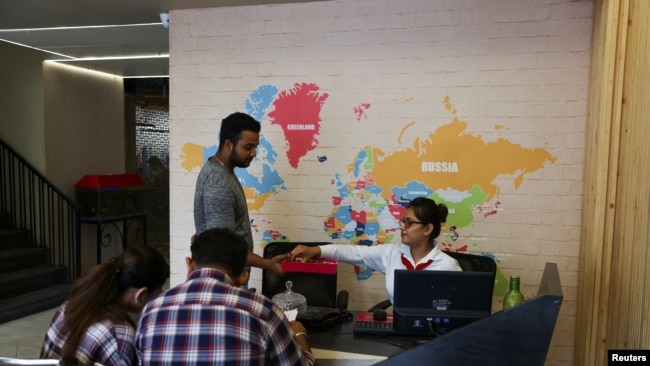
Increasing student numbers
Government agencies and education businesses follow the number of international students in countries like the U.S., Britain, Canada, Australia and New Zealand. They said there were about one million Indian students studying abroad in the first part of 2022.
That number is two times higher than before the COVID-19 pandemic restricted international travel. And it is likely to continue to increase.
For one, a new trade agreement between India and Australia means it will be easier for Indian students to study in places like Sydney.
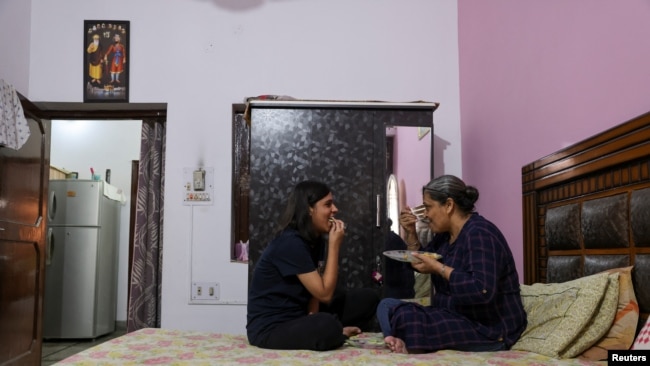
In addition, education experts believe universities are more interested in Indian students than before. That is because it is harder for Chinese students to travel. COVID-19 restrictions are still in place in China because of its zero-COVID policy.
Education costs rising
But the path to success in another country is not easy. The first problem is that many nations are having trouble processing student visas. Many visa offices reduced their work hours or stopped holding student visa interviews during the first part of the pandemic.
And the cost of attendance is extremely high even if a student is accepted to a university in another country. Nitika Mishra is a student studying broadcasting in London, Ontario. Mishra said international students must pay three times the amount Canadian students pay.
“It is a huge amount,” Mishra said. “Especially when it gets converted back into Indian currency.”
And, the value of the Indian rupee has gone down by seven percent this year.
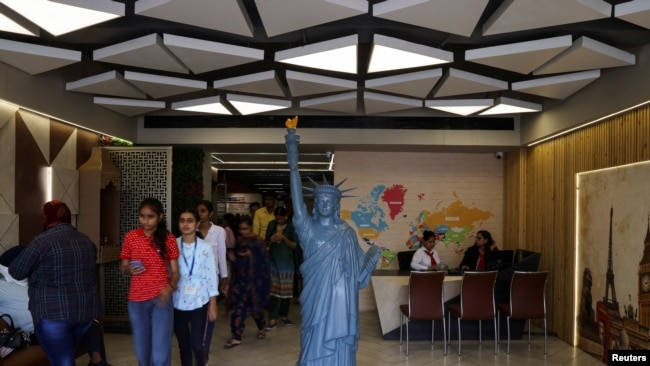
Worth the risk
Many Indians see college abroad as their best chance to have a better life. They see it as worth the risk. In the past, joining the military seemed like a good idea. But India recently reduced pay and job security for military members.
For example, India is no longer promising lifetime employment to soldiers. The government also reduced benefits offered to members of the military.
The changes resulted in protests earlier this year and made many young people think again about their job plans.
Vijay Chauhan is 18. He once thought about joining the army, and even went to take an entrance test.
“But now, I see no incentive to join,” he said. He is now taking English classes at Western Overseas. He does not see a future in staying in India.
“There is no option but to quit India,” he said.
More than marketing?
In the past, young Indians without a lot of money might not have been aware of the possibility of going away to school. But with more and more people getting internet service, they are receiving information about the visa companies like Western Overseas.
Some students go to information events at hotels in large cities to learn about study opportunities. Others can watch events conducted by video call.
At one event, over 500 students gathered to hear about universities in Australia and Canada. Gagandeep Singh went with his daughter, Jashandeep Kuar, who has been accepted at some universities in Australia.
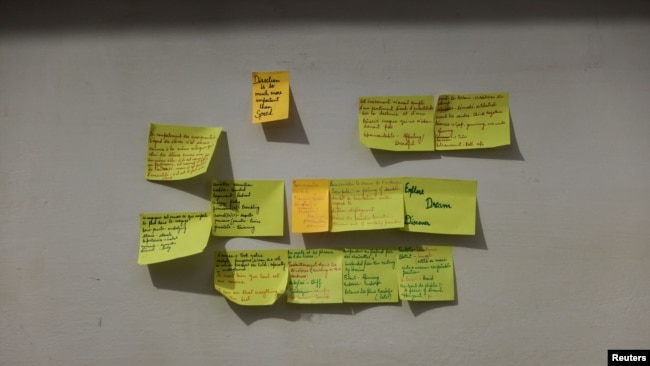
She said she is centering in on the University of Canberra, where her sister went to study pharmacy, the job of providing drugs and medicines doctors need for their patients.
Bhupesh Sharma is head of marketing for Western Overseas. Sharma said the company uses Facebook and other social media services to talk about its successes.
The company has sent almost 1,000 students to school in other countries. The leader of the company, Pradeep Baliyan, said he hopes to send 5,000 students abroad this year. The company has offices in nine large cities in India, plus Canada and Australia.
Companies like Western Overseas see the opportunity to get more customers because there are two big problems for young people in India right now. The country is having trouble offering enough higher education for its 300 million students and, for those who do not go to school, there is not enough work.
It is a bigger problem for women, as only 25 percent of women in India hold jobs. Young people see that many companies have reduced the number of good jobs in recent years.
Canadian universities are having success getting Indian students. They are working with international education companies like ApplyBoard and IDP Education, based in Australia, to find students.
David Tubbs is director of marketing communications with ApplyBoard. He said the company is connecting with Canadian universities on one side and the Indian visa agencies on the other.
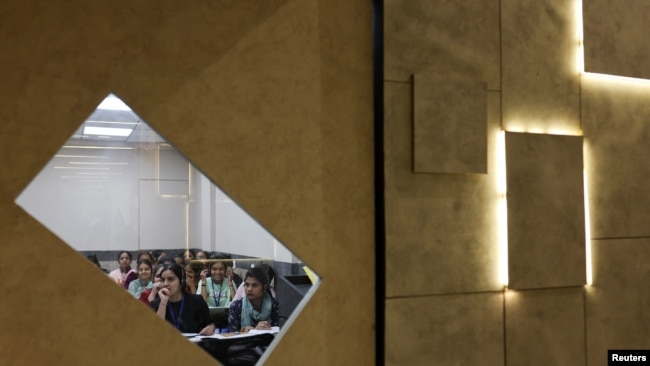
Canada had the second-highest number of Indian students last year. That is more than Australia and Britain but about 300,000 students fewer than the U.S.
But that number may change because many Indian families are seeing good results sending their children to Canada.
The universities there are not as costly, and work opportunities are good.
Rahul Oswal runs an education company called Wisdom Overseas.
He says there is a “rush” of Indian students coming to Canada.
“The ease of securing permanent residency has become a big draw,” he said.
I’m Jill Robbins. And I’m Dan Friedell.
Dan Friedell adapted this story for VOA Learning English based on a report by Reuters.
Quiz – Indian Students ‘Rush’ to Attend Colleges in Other Countries

Start the Quiz to find out
________________________________________________________________________
Words in This Story
admission –n. the process of accepting someone to a school
abroad –adv. in a foreign country
degree –n. a document showing the a course of study has been completed
interview –n. a meeting in which people talk to each other to get information
convert –v. to change into another form or kind
currency –n. the official money of a country
incentive –n. a reason to do something
option –n. a choice that can be made
benefit –n. money or something else that is provided as pay in return for working for a company, government or group
rush –v. a situation when a large number of people move to do some activity at nearly the same time
